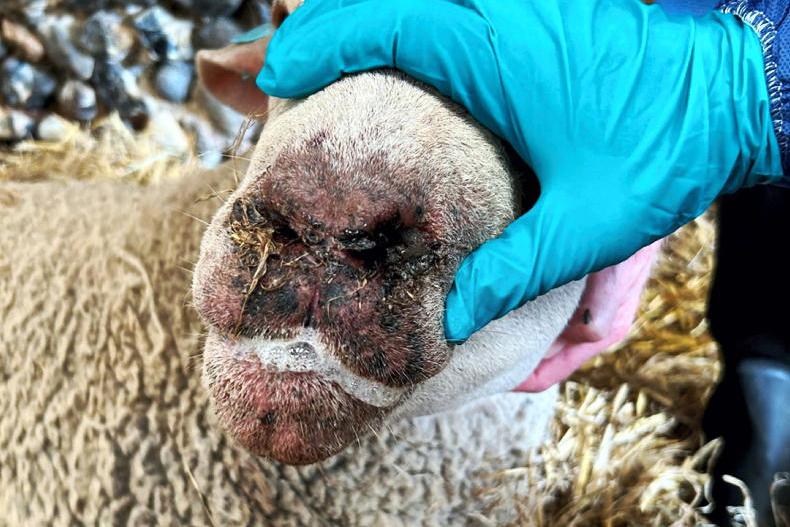Irish farmers need all the help they can get and one team member that can provide invaluable assistance is the farm dog; or at the very least they are a trusted, loyal companion if herding isn’t their strongest attribute.
The value of working dogs has increased significantly in recent times and we all know how important it is to protect our valuable assets.
The milking machine and tractor are regularly serviced and the sheds get a good clean, so the next time you are speaking to your local vet practice why not enquire about the dog’s annual “service”.
Vaccination, parasite treatment and a general health check will mean they are protected against disease and that other health issues can be identified early before they may affect your dog’s ability to work.
It is particularly important that pups are correctly vaccinated
We are well aware of the importance of vaccination and preventative health in cattle and sheep, but it is also important to remember that there are many potentially fatal diseases that dogs can be exposed to.
In fact, they may be at a higher risk of exposure to certain diseases due to the fact they live in an agricultural setting.
It is particularly important that pups are correctly vaccinated, as these are the most susceptible group to many of the lethal diseases vaccination protects against.
However, for all dogs, annual vaccination is required to ensure consistent protection against some of the main diseases they are vulnerable to.
We will now look at some of the most common of these in a little more detail with a summary provided in Table 1.
Leptospirosis
Leptospirosis is recognised as the most widespread zoonotic disease worldwide. Humans can pick up infection from infected animals, resulting in serious illness known as Weil’s disease.
There are several different strains of leptospirosis and due to the chance of contact with rodents and urine-contaminated water, farm dogs are one of the high-risk groups for exposure.
Parvo
The cause of this common illness is a small, but extremely hardy parvovirus that can survive in the environment for long periods of time and is resistant to many household disinfectants.
While the main sources are listed in Table 1, the virus can also spread on shoes and clothing and on the coat and pads of dogs.
This means that all dogs, even those who don’t meet other dogs, are potentially at risk.
Since the pandemic began, we have seen an increase in dog ownership and you may have noticed more dogs being brought on country walks along your road.
Consequently, there is a higher potential for your dogs to pick up diseases such as parvo from the environment. There is no specific treatment for parvovirus infection.
Distemper
Canine distemper virus is now an uncommon, but deadly viral disease of dogs, which can initially cause mild signs, with survivors going on to show serious neurological signs, including seizures, several weeks later.
There is no specific treatment for distemper. Vaccination has rendered this disease uncommon, but some cases are still reported each year.
Infectious canine hepatitis
Infectious canine hepatitis (ICH) is another highly infectious viral disease of dogs which can cause mild signs in some individuals, but may be fatal in others. Again, there is no specific treatment.
Canine cough
Canine cough is the most common infectious disease of dogs in Ireland. It is extremely contagious, affects all ages and any dog coming into contact with other dogs is susceptible.
As the name suggests, the key sign is a harsh, dry cough – very much like whooping cough in humans.
The coughing can last for several weeks and during this time more serious complications, such as pneumonia, may arise.
Vaccines
Vaccines are available against all of the above diseases. It is particularly important that puppies are vaccinated as young as possible (from six weeks old), as they are especially susceptible to these diseases.
When starting vaccination, some of these diseases require a primary course of two doses to confer solid immunity. Boosters are required in subsequent years to maintain immunity.
Leptospirosis and canine cough vaccines need to be given annually, while vaccines against parvo, distemper and hepatitis can be given more infrequently, depending on the vaccine used. Your local vet is best placed to advised you on the best regime for your dog(s).
Dosing for parasites is a big part of the work involved on farm, but it is important to remember that there are many parasites that can affect dogs also.
Regular de-worming treatment is important, as is protection against external parasites, ie fleas, mange mites and ticks.
Due to the amount of time farm dogs spend outdoors, the risk of exposure to ticks, for example, is particularly high. Like redwater in cattle, ticks can also carry diseases which are dangerous for dogs if exposed to them.
Contrary to previous beliefs, ticks and fleas are a year-round problem for dogs, hence it is important that we implement a reliable treatment regime to protect them.
Products that provide almost three months of protection against fleas, ticks and treatment of mites are particularly useful in facilitating year-round protection.
Worming protocols are based on risk of various diseases including roundworm, tapeworm, lungworm, whipworm and others. This is a discussion you need to have with your vet to match the best product to your situation.
Vaccination and parasite treatment of your “best friend” are key to their health.Always consult your local vet for information and advice on the most appropriate vaccinations and parasite treatments for the farm dog(s).Booster vaccination and repeat parasite treatments are important for protection and your vet will be able to provide reminders to ensure they are kept up to date.
Irish farmers need all the help they can get and one team member that can provide invaluable assistance is the farm dog; or at the very least they are a trusted, loyal companion if herding isn’t their strongest attribute.
The value of working dogs has increased significantly in recent times and we all know how important it is to protect our valuable assets.
The milking machine and tractor are regularly serviced and the sheds get a good clean, so the next time you are speaking to your local vet practice why not enquire about the dog’s annual “service”.
Vaccination, parasite treatment and a general health check will mean they are protected against disease and that other health issues can be identified early before they may affect your dog’s ability to work.
It is particularly important that pups are correctly vaccinated
We are well aware of the importance of vaccination and preventative health in cattle and sheep, but it is also important to remember that there are many potentially fatal diseases that dogs can be exposed to.
In fact, they may be at a higher risk of exposure to certain diseases due to the fact they live in an agricultural setting.
It is particularly important that pups are correctly vaccinated, as these are the most susceptible group to many of the lethal diseases vaccination protects against.
However, for all dogs, annual vaccination is required to ensure consistent protection against some of the main diseases they are vulnerable to.
We will now look at some of the most common of these in a little more detail with a summary provided in Table 1.
Leptospirosis
Leptospirosis is recognised as the most widespread zoonotic disease worldwide. Humans can pick up infection from infected animals, resulting in serious illness known as Weil’s disease.
There are several different strains of leptospirosis and due to the chance of contact with rodents and urine-contaminated water, farm dogs are one of the high-risk groups for exposure.
Parvo
The cause of this common illness is a small, but extremely hardy parvovirus that can survive in the environment for long periods of time and is resistant to many household disinfectants.
While the main sources are listed in Table 1, the virus can also spread on shoes and clothing and on the coat and pads of dogs.
This means that all dogs, even those who don’t meet other dogs, are potentially at risk.
Since the pandemic began, we have seen an increase in dog ownership and you may have noticed more dogs being brought on country walks along your road.
Consequently, there is a higher potential for your dogs to pick up diseases such as parvo from the environment. There is no specific treatment for parvovirus infection.
Distemper
Canine distemper virus is now an uncommon, but deadly viral disease of dogs, which can initially cause mild signs, with survivors going on to show serious neurological signs, including seizures, several weeks later.
There is no specific treatment for distemper. Vaccination has rendered this disease uncommon, but some cases are still reported each year.
Infectious canine hepatitis
Infectious canine hepatitis (ICH) is another highly infectious viral disease of dogs which can cause mild signs in some individuals, but may be fatal in others. Again, there is no specific treatment.
Canine cough
Canine cough is the most common infectious disease of dogs in Ireland. It is extremely contagious, affects all ages and any dog coming into contact with other dogs is susceptible.
As the name suggests, the key sign is a harsh, dry cough – very much like whooping cough in humans.
The coughing can last for several weeks and during this time more serious complications, such as pneumonia, may arise.
Vaccines
Vaccines are available against all of the above diseases. It is particularly important that puppies are vaccinated as young as possible (from six weeks old), as they are especially susceptible to these diseases.
When starting vaccination, some of these diseases require a primary course of two doses to confer solid immunity. Boosters are required in subsequent years to maintain immunity.
Leptospirosis and canine cough vaccines need to be given annually, while vaccines against parvo, distemper and hepatitis can be given more infrequently, depending on the vaccine used. Your local vet is best placed to advised you on the best regime for your dog(s).
Dosing for parasites is a big part of the work involved on farm, but it is important to remember that there are many parasites that can affect dogs also.
Regular de-worming treatment is important, as is protection against external parasites, ie fleas, mange mites and ticks.
Due to the amount of time farm dogs spend outdoors, the risk of exposure to ticks, for example, is particularly high. Like redwater in cattle, ticks can also carry diseases which are dangerous for dogs if exposed to them.
Contrary to previous beliefs, ticks and fleas are a year-round problem for dogs, hence it is important that we implement a reliable treatment regime to protect them.
Products that provide almost three months of protection against fleas, ticks and treatment of mites are particularly useful in facilitating year-round protection.
Worming protocols are based on risk of various diseases including roundworm, tapeworm, lungworm, whipworm and others. This is a discussion you need to have with your vet to match the best product to your situation.
Vaccination and parasite treatment of your “best friend” are key to their health.Always consult your local vet for information and advice on the most appropriate vaccinations and parasite treatments for the farm dog(s).Booster vaccination and repeat parasite treatments are important for protection and your vet will be able to provide reminders to ensure they are kept up to date. 








SHARING OPTIONS